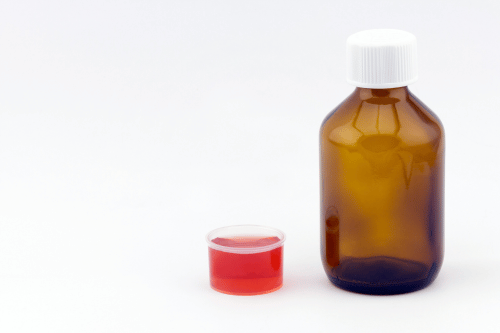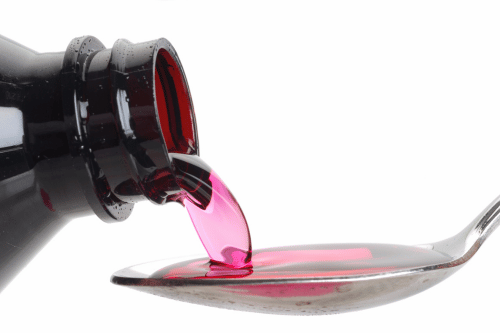

Lean, also known as “purple drank” or “dirty sprite,” is a recreational drug concoction made from codeine cough syrup mixed with soft drinks and sometimes hard candy for flavor. This mixture contains codeine and promethazine, two substances that produce sedating effects when consumed in high doses. While lean has gained notoriety in pop culture and the hip hop music scene, it poses significant health risks and is classified as an illicit substance when used outside of medical purposes.
Lean, also known as purple drank, is a recreational beverage that typically contains codeine-based cough syrup, soda, and hard candy. The primary ingredient in lean is prescription cough syrup containing codeine, a narcotic opioid, and promethazine, an antihistamine with sedating effects. Codeine acts on opioid receptors in the brain to produce relaxation, euphoria, and pain relief, while promethazine amplifies these effects by depressing the central nervous system, leading to drowsiness, impaired coordination, and slowed heartbeat.

Lean typically includes prescription cough syrup containing codeine, a mild opioid, and promethazine, an antihistamine. These ingredients are mixed with a soft drink like Mountain Dew or Sprite, and sometimes hard candy is added to enhance the flavor. This combination gives lean its distinctive color and sweet taste, making it deceptively appealing to young adults. The ingredients used to make lean, particularly the codeine and promethazine, are not designed for recreational use and carry a high potential for abuse and addiction. By masking the bitter taste of the cough syrup, the added soft drinks and candy create an appealing but dangerous concoction.
Lean drinkers often customize the mixture’s ratios, making the strength of the lean drink unpredictable. These customizations can significantly amplify the risks, especially when consumed alongside other substances like alcohol or prescription opioids. This unpredictability has led to numerous cases of overdoses and hospitalizations.
Lean originated in the 1960s in Houston, Texas, as a cheap and easy way to get high. It gained popularity in the 1990s when hip-hop legends like DJ Screw and Three 6 Mafia began referencing the drink in their music and videos, associating it with hip-hop culture. Today, lean remains widely abused for its euphoric high and feelings of relaxation, particularly among young adults. Despite its dangers, lean is often glamorized in rap and hip-hop lyrics, leading to its popularity among young people.
The effects of lean can be both sedating and euphoric due to its opioid and antihistamine content. However, its use can lead to dangerous effects, including:
Respiratory depression
Slowed heartbeat
Shallow breathing
Blurred vision
Weight gain
Tooth decay
The sedating effects of lean may feel relaxing, but these come at a high cost. Chronic use can result in physical dependence and lean addiction, which can be life-threatening without proper treatment. Beyond the immediate physical effects, long-term use of lean can severely impact mental health, contributing to anxiety, depression, and cognitive impairments. The sugar-laden mixtures also lead to other health issues such as obesity and dental problems.
Repeated use can cause a compounding effect on the body’s systems, leading to deteriorating organ function, particularly in the liver and kidneys. The high levels of promethazine in lean can also exacerbate sedation, impairing motor skills and increasing the likelihood of accidents and injuries. Over time, the body’s tolerance to codeine increases, driving users to consume larger quantities to achieve the same effect, which significantly raises the risk of an overdose. Lean overdose occurs due to the sedating effects of its ingredients, posing severe consequences such as central nervous system depression and dangerous interactions with other medications. Immediate medical attention is crucial in such cases.
Lean is dangerous because of its impact on the central nervous system. Codeine, being an opioid, can cause respiratory depression, especially when consumed in large quantities. The antihistamine promethazine enhances these sedative properties, increasing the risk of a fatal overdose.
The Drug Enforcement Administration (DEA) has been actively involved in addressing the abuse of lean, particularly due to its rising popularity in the South. By 2006, the DEA had intensified its focus on this issue, reflecting the growing concerns over substance abuse associated with lean.
Other risks associated with lean use include:
Higher risk of respiratory arrest
Codeine overdose
Dangerous effects on blood pressure
Risky behaviors influenced by impaired judgment
The interaction between codeine and promethazine in lean amplifies the sedative effects, making it extremely dangerous when combined with other drugs, particularly depressants like alcohol. This combination can lead to respiratory arrest, a condition in which breathing slows or stops altogether, often resulting in death without immediate medical intervention. Furthermore, chronic use of lean often masks the severity of its damage until significant health complications arise, such as organ failure or severe cognitive decline.
The prevalence of lean in the hip hop music scene has glamorized its use, particularly among young adults. Prominent music artists have referenced “drinking lean” in their lyrics, often seen holding styrofoam cups—a symbol of the drug in pop culture. While this association with rap and hip hop has popularized lean, it has also contributed to its widespread abuse.
The evolution and cultural impact of cough syrup abuse, particularly in relation to lean, highlight its transition from an obscure practice to a mainstream trend. This mixture gained popularity with musicians and later became a widespread trend across the United States, escalating in the 2000s and leading to concerns from authorities like the DEA.
Social media platforms and music videos often portray lean use as a status symbol, downplaying its harmful consequences. The glamorization of lean in popular culture obscures its risks, enticing younger audiences to experiment with the drug. The normalization of lean as part of a lifestyle promoted in music and media perpetuates substance abuse among impressionable demographics. Despite growing awareness of its dangers, the association with fame and success continues to overshadow public health campaigns aimed at curbing its use.
Lean addiction can manifest through both behavioral and physical signs. A few signs of lean abuse include:
Persistent use despite negative consequences
Withdrawal symptoms such as nausea, sweating, and anxiety
Increased tolerance, requiring higher doses to achieve the same effects
Lean abuse often leads to substance use disorders, requiring professional treatment to manage withdrawal symptoms and break the cycle of addiction. Additional warning signs include secretive behaviors, neglecting responsibilities, and financial difficulties caused by the cost of acquiring prescription cough syrups illegally. Over time, individuals addicted to lean may experience worsening health, strained relationships, and diminished quality of life.
Withdrawal from lean can be particularly challenging due to its combination of opioid and antihistamine components. Symptoms such as insomnia, muscle aches, and intense cravings often deter users from seeking help, prolonging the cycle of addiction. Recognizing these symptoms early and understanding the underlying causes of addiction are critical steps toward recovery.
When an individual stops using lean, they may experience withdrawal symptoms, which can be uncomfortable and even life-threatening. Withdrawal symptoms can include anxiety, insomnia, muscle aches, nausea, vomiting, diarrhea, headaches, sweating, and chills. Cognitive behavioral therapy can teach individuals how to change thought distortions and respond to cravings, triggers, and stressors in a healthy way. A comprehensive treatment program provides the support and education necessary for achieving a sustained recovery.
Effective treatment for lean addiction typically begins with a medically supervised detox. This process helps individuals manage withdrawal symptoms safely. Following detox, treatment programs may include:
Behavioral therapy
Support groups
Medication-assisted treatment for opioid withdrawal
The abuse of codeine-promethazine cough syrups, often associated with the recreational drug ‘lean’, poses significant health risks, including the danger of overdose. The National Institute on Drug Abuse emphasizes the importance of comprehensive treatment programs to address both the physical and psychological aspects of addiction. Holistic approaches, including counseling and lifestyle changes, are essential to long-term recovery. Engaging with supportive communities and developing healthy coping mechanisms are crucial for maintaining sobriety.
Rehabilitation facilities like Sullivan Recovery offer tailored treatment plans to address the unique challenges of lean addiction. These programs combine medical care, therapy, and peer support to empower individuals on their journey to recovery. By providing a structured and compassionate environment, treatment centers help individuals rebuild their lives and reclaim their sense of purpose.
Prevention and education are key to addressing the issue of lean abuse. It is essential to educate young adults about the dangers of lean and the risks associated with its use. Parents, educators, and healthcare professionals can play a crucial role in preventing lean abuse by providing accurate information and promoting healthy coping mechanisms. Additionally, treatment centers and healthcare providers can offer support and guidance to individuals struggling with lean addiction. By working together, we can reduce the prevalence of lean abuse and promote a healthier, safer community.
Lean is a drug that poses severe risks to health and well-being. While its association with the hip hop music scene and popular culture has normalized its use, the consequences of lean abuse are far from glamorous. Beyond the physical dangers, lean addiction disrupts lives, damages relationships, and undermines overall health.
If you or a loved one is struggling with lean addiction, seeking help through professional treatment programs is essential. Early intervention and comprehensive care can make the difference between a life constrained by addiction and one enriched by recovery. Sullivan Recovery offers the support and resources needed to overcome addiction and reclaim a healthy, fulfilling life. With the right help, recovery is possible, and a brighter future awaits.

At Sullivan Recovery, as an in-network provider we work with most insurance plans, such as:
And More
If you or a loved one are struggling with mental health challenges or substance abuse, reach out to Sullivan Recovery today. Our team of compassionate professionals is here to support your journey towards lasting well-being. Give us a call at 949-836-7180.
Lean, also known as purple drank or sizzurp, is a recreational drug made by mixing prescription-strength cough syrup with soda. It is considered a drug due to its psychoactive effects.
Lean typically contains codeine, an opioid found in certain cough syrups, and promethazine, an antihistamine. These ingredients are mixed with soda and sometimes candy for flavor.
Lean poses serious health risks, including respiratory depression, addiction, liver damage, and overdose. Long-term use can lead to severe health complications and dependency.
Lean gained popularity through music and pop culture, often glamorized by celebrities. However, its use carries significant risks and should not be taken lightly.